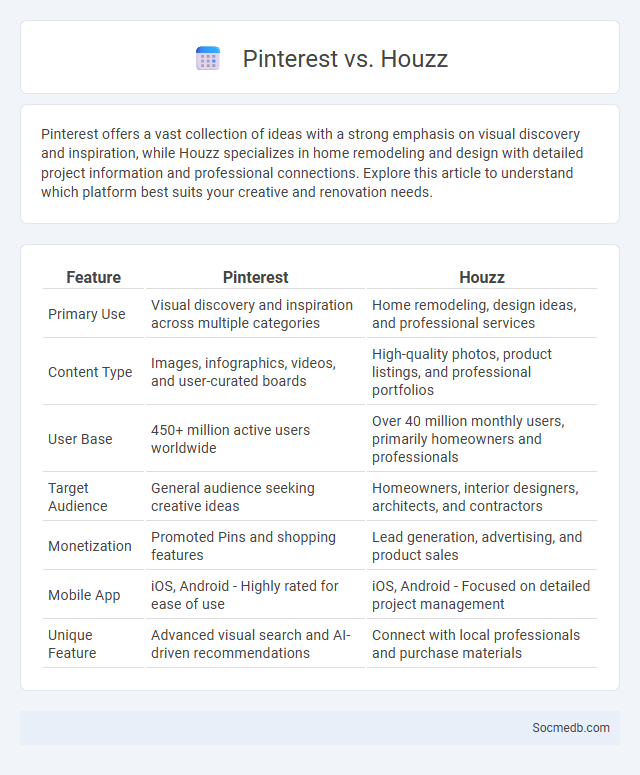
Photo illustration: Pinterest vs Houzz
Pinterest offers a vast collection of ideas with a strong emphasis on visual discovery and inspiration, while Houzz specializes in home remodeling and design with detailed project information and professional connections. Explore this article to understand which platform best suits your creative and renovation needs.
Table of Comparison
| Feature | Houzz | |
|---|---|---|
| Primary Use | Visual discovery and inspiration across multiple categories | Home remodeling, design ideas, and professional services |
| Content Type | Images, infographics, videos, and user-curated boards | High-quality photos, product listings, and professional portfolios |
| User Base | 450+ million active users worldwide | Over 40 million monthly users, primarily homeowners and professionals |
| Target Audience | General audience seeking creative ideas | Homeowners, interior designers, architects, and contractors |
| Monetization | Promoted Pins and shopping features | Lead generation, advertising, and product sales |
| Mobile App | iOS, Android - Highly rated for ease of use | iOS, Android - Focused on detailed project management |
| Unique Feature | Advanced visual search and AI-driven recommendations | Connect with local professionals and purchase materials |
Introduction to Visual Inspiration Platforms
Visual inspiration platforms like Pinterest and Instagram have revolutionized content discovery by enabling users to explore and curate images, videos, and ideas tailored to their interests. These platforms utilize advanced algorithms and user-generated content to provide personalized and trending visual feeds that spark creativity across design, fashion, art, and lifestyle sectors. Integrating hashtags, boards, and collaborative features, visual inspiration platforms facilitate seamless idea sharing and community engagement, driving innovation in social media interactions.
Overview: Pinterest, Houzz, and Visual Search
Pinterest, Houzz, and Visual Search represent powerful tools in social media focused on inspiration and discovery through images. Pinterest serves as a visual discovery platform enabling users to find ideas for cooking, design, and fashion, while Houzz specializes in home remodeling and interior design with extensive photo galleries and professional connections. Visual Search technology allows users to search for products and ideas using images rather than keywords, enhancing user engagement and improving e-commerce conversion rates.
User Interface and Experience Comparison
Social media platforms like Facebook, Instagram, and Twitter prioritize intuitive user interfaces (UI) that enhance user experience (UX) through streamlined navigation and interactive features. Instagram emphasizes visual content with a minimalist design and in-app stories providing immersive engagement, while Twitter focuses on real-time updates and concise content with a simple timeline format. Facebook combines extensive functionalities with customizable settings that cater to diverse user preferences, balancing complexity and usability for a broad demographic.
Content Discovery Features
Social media platforms utilize advanced content discovery features such as personalized algorithms, trending hashtags, and recommendation engines to enhance user engagement and relevance. These tools analyze user behavior, preferences, and social interactions to curate tailored content feeds that boost visibility and interaction rates. Integrating AI-driven content suggestions and real-time analytics optimizes the discovery process, driving organic reach and platform growth.
Personalized Recommendations and Algorithms
Social media platforms use advanced algorithms to analyze your behavior, preferences, and interactions to deliver personalized recommendations that enhance engagement and user experience. These algorithms continuously learn and adapt, improving content relevance and ensuring you see posts, ads, and connections tailored to your interests. Leveraging machine learning and data analytics, personalized recommendations drive higher retention and satisfaction on platforms like Facebook, Instagram, and TikTok.
Visual Search Technology Capabilities
Visual search technology leverages artificial intelligence and machine learning to analyze images and provide relevant search results based on visual content rather than text alone. Social media platforms incorporate this capability to enhance user experience by enabling You to discover products, trends, and visually similar content effortlessly through image recognition. This advanced technology improves content discoverability, personalization, and engagement by connecting users with visually relevant information across vast multimedia databases.
Community Engagement and Social Features
Social media platforms enhance community engagement by fostering meaningful interactions through comments, shares, and live discussions that keep users connected and invested. Social features like groups, events, polls, and direct messaging facilitate collaboration and create a sense of belonging among members. Your active participation in these features can significantly boost your network's growth and deepen relationships within your digital community.
Commercial Use: Shopping and Product Integration
Social media platforms enhance commercial use by integrating seamless shopping experiences directly within user feeds, enabling brands to showcase products through shoppable posts and stories. Features like Instagram Shopping and Facebook Shops allow businesses to tag products, provide pricing, and link to purchase pages, streamlining the consumer journey from discovery to checkout. This integration boosts e-commerce sales by leveraging social engagement and targeted advertising algorithms to increase product visibility and conversion rates.
Pros and Cons of Each Platform
Facebook offers extensive networking opportunities with diverse content sharing but faces criticism over privacy issues and misinformation spread. Instagram excels in visual storytelling and brand promotion, yet struggles with algorithm-driven content visibility and mental health concerns. Twitter enables real-time news and public discourse but often contends with character limits that hinder detailed conversations and a high prevalence of misinformation.
Which Platform Suits Your Needs?
Choosing the right social media platform depends on your target audience, content type, and engagement goals. Instagram excels for visual storytelling and brand aesthetics, while LinkedIn is ideal for professional networking and B2B marketing. TikTok offers high potential for viral short-form videos, making it perfect for reaching younger demographics with creative, trendy content.
 socmedb.com
socmedb.com